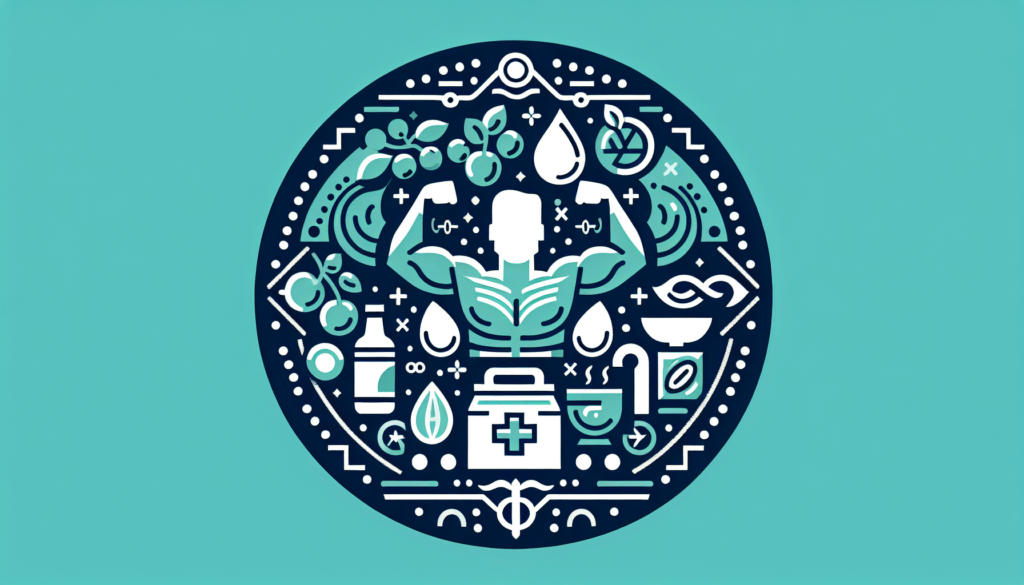In this article, we will explore the important nutritional considerations for effectively managing the health of boomer men. As men age, their bodies undergo various changes and require specific nutrients to support optimal health and wellbeing. Understanding these nutritional considerations can play a crucial role in promoting a healthy lifestyle and preventing common age-related health issues. So, whether you are a boomer man yourself or someone looking out for the wellbeing of a loved one, delve into this informative article to discover the essential dietary factors that can contribute to men’s health in this stage of life.

Overall Nutritional Guidelines
Importance of a balanced diet
Maintaining a balanced diet is crucial for the overall health and well-being of boomer men. A balanced diet ensures that you are receiving all the essential nutrients, vitamins, and minerals your body needs to function properly. By including a variety of foods from different food groups, you can provide your body with the fuel it needs to stay healthy and energetic.
Caloric needs for boomer men
As a boomer man, your caloric needs may differ from those of younger individuals. It is important to consult with a healthcare professional to determine the appropriate caloric intake for your age, weight, and activity level. By closely monitoring your caloric intake, you can maintain a healthy weight and reduce the risk of developing chronic diseases, such as diabetes and heart disease.
Recommended daily intake of macronutrients
Macronutrients, including carbohydrates, proteins, and fats, play a vital role in boomer men’s nutrition. Carbohydrates provide energy, proteins support muscle growth and repair, and fats are essential for various bodily functions. The recommended daily intake of macronutrients may vary depending on your individual needs and health goals. A well-balanced diet should include a sufficient amount of each macronutrient to support optimal health.
Micronutrient requirements
Micronutrients, such as vitamins and minerals, are essential for your overall health. As a boomer man, it is important to ensure you are meeting your daily requirements for these vital nutrients. Nutrients like calcium and vitamin D are crucial for bone health, while antioxidants like vitamin C and E help protect against cellular damage. Including a variety of fruits, vegetables, whole grains, and lean proteins in your diet can help you meet your micronutrient needs.
Importance of hydration
Staying adequately hydrated is essential for maintaining optimal health. Water plays a crucial role in regulating body temperature, lubricating joints, transporting nutrients, and removing waste products from the body. It is recommended that boomer men aim to drink at least eight cups (64 ounces) of water per day. However, individual hydration needs may vary depending on factors such as activity level, climate, and overall health.
Specific Nutritional Considerations
Hormonal balance
As men age, hormonal changes occur that can impact their overall health. One important hormonal consideration for boomer men is maintaining healthy testosterone levels. To support hormonal balance, it is important to include an adequate amount of healthy fats in the diet, such as those found in avocados, nuts, and olive oil. Additionally, regular exercise and maintaining a healthy weight can help support hormonal balance.
Prostate health
Prostate health is a significant concern for many boomer men. To support prostate health, it is important to consume foods rich in nutrients like lycopene, vitamin E, and zinc. Tomatoes, watermelon, nuts, and seeds are all excellent sources of these nutrients. Additionally, reducing the intake of processed and red meats may help lower the risk of prostate issues.
Cardiovascular health
Heart disease is a leading cause of death among boomer men. To support cardiovascular health, it is important to adopt a heart-healthy diet. This includes consuming foods low in saturated and trans fats, limiting sodium intake, and increasing consumption of fruits, vegetables, whole grains, and lean proteins. Regular exercise and managing stress levels are also important factors in maintaining a healthy heart.
Bone health
Osteoporosis, a condition characterized by weak and brittle bones, is a concern for many older men. To support bone health, ensure an adequate intake of calcium and vitamin D. Dairy products, leafy green vegetables, and fortified products are excellent sources of calcium, while sunlight and fortified foods are good sources of vitamin D. Regular weight-bearing exercises, such as walking or weightlifting, can also help maintain bone density.
Muscle health
Maintaining muscle mass becomes more challenging as men age. To promote muscle health, it is important to consume an adequate amount of protein. Lean meats, fish, poultry, dairy products, and plant-based protein sources like legumes and tofu are all great options. Regular resistance training exercises, such as lifting weights or using resistance bands, can also help preserve muscle mass.
Weight management
Maintaining a healthy weight is essential for overall health and reducing the risk of chronic diseases. To manage weight, focus on consuming a balanced diet that consists of whole, nutrient-dense foods and portion control. Incorporate regular physical activity into your routine and prioritize lifestyle habits that promote a healthy weight, such as adequate sleep and stress management.
Digestive health
Digestive issues can become more prevalent as men age. To support digestive health, include an adequate amount of dietary fiber in your diet. Fiber-rich foods, such as whole grains, fruits, vegetables, and legumes, promote regular bowel movements and prevent constipation. It is also important to stay hydrated and engage in regular physical activity to support optimal digestion.
Brain health
Maintaining cognitive function and brain health is vital for overall well-being. Including foods rich in antioxidants, omega-3 fatty acids, and B vitamins can support brain health. Blueberries, leafy greens, fatty fish, nuts, seeds, and whole grains are all excellent choices. Engaging in mental stimulation activities, such as reading or puzzles, can also help maintain brain health.
Eye health
As men age, the risk of age-related eye diseases, such as macular degeneration and cataracts, increases. To support eye health, incorporate foods rich in antioxidants, vitamins C and E, and omega-3 fatty acids into your diet. Colorful fruits and vegetables, particularly those with orange, red, and dark green hues, are excellent choices. Regular eye exams are also important for early detection and treatment of any potential issues.
Immune system support
Maintaining a strong immune system is crucial for fighting off infections and staying healthy. To support immune system function, consume a diet rich in fruits, vegetables, whole grains, lean proteins, and healthy fats. Incorporate immune-boosting nutrients such as vitamin C, vitamin D, zinc, and selenium. Adequate sleep, regular exercise, stress management, and good hygiene practices also play a crucial role in supporting the immune system.

Meal Planning Tips
Choosing nutrient-dense foods
When planning meals, focus on incorporating nutrient-dense foods that provide a high amount of vitamins, minerals, and other beneficial compounds. This includes fruits, vegetables, lean proteins, whole grains, and healthy fats. Avoid heavily processed foods that are often high in added sugars, unhealthy fats, and sodium.
Incorporating a variety of fruits and vegetables
Including a wide variety of fruits and vegetables ensures that you receive a range of important vitamins, minerals, and antioxidants. Different colors indicate different nutrient profiles, so aim for a colorful plate. Incorporate raw, cooked, and even fermented fruits and vegetables to maximize nutritional benefits.
Including lean sources of protein
Protein is essential for building and repairing tissues, supporting immune function, and regulating hormones. Choose lean sources of protein, such as skinless poultry, fish, legumes, and low-fat dairy products. Limit the intake of processed meats that can be high in unhealthy fats and sodium.
Opting for whole grains
Whole grains, such as brown rice, whole wheat, quinoa, and oats, provide more fiber, vitamins, and minerals compared to refined grains. They also keep you feeling fuller for longer, helping to prevent overeating. Aim to make at least half of your grain choices whole grains.
Limiting processed foods and added sugars
Processed foods often contain high amounts of added sugars, unhealthy fats, and sodium. These can contribute to weight gain, chronic diseases, and overall poor health. Opt for whole, unprocessed foods as much as possible and monitor your added sugar intake by reading food labels.
Meal timing and portion control
Establish regular meal times and practice portion control to maintain a healthy weight and avoid overeating. Eating mindfully and slowly can help you recognize when you are full. Additionally, consider using smaller plates, bowls, and utensils to help control portion sizes.
Modifying recipes to improve nutritional value
Experiment with modifying recipes to make them more nutritious. Replace unhealthy ingredients with healthier alternatives, such as swapping refined flour with whole grain flour or using unsaturated fats instead of saturated fats. Increase the amount of vegetables and reduce the amount of added sugars and sodium when possible.
Supplementation
Role of supplements in men’s health
Supplements can be a valuable addition to a healthy diet. They can help bridge any nutrient gaps and provide additional support for specific health concerns. However, it is important to remember that supplements should not replace a balanced diet and healthy lifestyle choices.
Common supplements for boomer men
Certain supplements are commonly recommended for boomer men. These may include omega-3 fatty acids, vitamin D, calcium, magnesium, and B vitamins. Omega-3 fatty acids support heart health, while vitamin D and calcium promote bone health. Magnesium and B vitamins are essential for various bodily functions, including energy production and nerve function.
Consulting with a healthcare professional
Before starting any new supplements or making changes to your current regimen, it is crucial to consult with a healthcare professional. They can help assess your individual needs, potential interactions with medications, and ensure you are taking supplements at appropriate dosages.
Quality and safety considerations
When choosing supplements, it is important to prioritize quality and safety. Look for reputable brands that undergo third-party testing to ensure purity, potency, and absence of contaminants. Read product labels carefully, follow recommended dosages, and be aware of potential side effects or contraindications.

Exercise and Nutritional Needs
Importance of physical activity
Engaging in regular physical activity is crucial for managing men’s health. Exercise helps maintain a healthy weight, supports cardiovascular health, strengthens bones and muscles, improves mood, and enhances overall well-being. Aim for a combination of aerobic exercise, strength-training, and flexibility exercises for optimal benefits.
Optimal nutrition for exercise performance
To support exercise performance, it is important to fuel your body properly. Carbohydrates provide the primary source of energy during physical activity, while proteins support muscle repair and recovery. Adequate hydration before, during, and after exercise is also essential. Including a balance of carbohydrates, proteins, and healthy fats in your pre and post-workout meals and snacks can optimize performance and aid in muscle recovery.
Pre- and post-workout nutrition
Before a workout, aim for a small meal or snack that provides a combination of carbohydrates and protein. This can include a banana with nut butter, yogurt with berries, or a whole grain wrap with lean protein. After a workout, focus on consuming a meal or snack that replenishes glycogen stores and promotes muscle repair and recovery. This can include a protein shake, a balanced meal with lean protein, and carbohydrates, or a Greek yogurt with fruits and nuts.
Lifestyle Factors
Stress management
Chronic stress can have detrimental effects on overall health. Engaging in stress management techniques, such as meditation, deep breathing exercises, yoga, or engaging in hobbies, can help reduce stress levels. When under stress, individuals often turn to unhealthy coping mechanisms, such as emotional eating or substance abuse, which can negatively impact nutrition.
Smoking cessation
Quitting smoking is one of the most important steps you can take to improve your overall health. Smoking damages almost every organ in the body and increases the risk of serious diseases such as cancer, heart disease, and respiratory issues. Seek support from healthcare professionals, join a smoking cessation program, or use resources available to help you quit smoking.
Alcohol consumption
Moderate alcohol consumption may have some health benefits, particularly for cardiovascular health. However, excessive alcohol intake can lead to liver damage, increased blood pressure, and other health issues. If you choose to consume alcohol, do so in moderation. The recommended limit is up to one drink per day for men.
Sleep and its impact on nutrition
Getting adequate sleep is essential for overall health and well-being. Poor sleep can disrupt hormone regulation, increase appetite, and lead to unhealthy food choices. Aim for 7-9 hours of quality sleep per night. Establishing a consistent sleep routine, creating a conducive sleep environment, and practicing relaxation techniques can help improve sleep quality.

Health Conditions and Nutritional Adaptations
Diabetes
If you have diabetes, managing your diet plays a crucial role in maintaining stable blood sugar levels. Focus on consuming balanced meals with controlled portions, spread throughout the day. Limit your intake of sugary foods and beverages and opt for whole, unprocessed foods. Regular monitoring of blood glucose levels and working closely with a healthcare professional is important to manage diabetes effectively.
Heart disease
A heart-healthy diet is essential for managing heart disease and preventing further complications. This includes consuming foods low in saturated and trans fats, cholesterol, and sodium. Focus on whole grains, lean proteins, fruits, vegetables, and healthy fats. Avoid processed and fried foods that are high in unhealthy fats and sodium.
Prostate cancer
While diet alone cannot prevent or cure prostate cancer, certain dietary factors may help reduce the risk or slow its progression. Incorporate a variety of fruits, vegetables, whole grains, and lean proteins into your diet. Reduce the intake of processed and red meats and limit saturated fat. Discuss specific dietary recommendations with your healthcare professional.
Osteoporosis
To support bone health and prevent osteoporosis, it is important to ensure an adequate intake of calcium and vitamin D. Dairy products, leafy green vegetables, and fortified products are excellent sources of calcium. Sunlight and fortified foods are good sources of vitamin D. Regular weight-bearing exercises, such as walking or weightlifting, can also help maintain bone density.
Digestive disorders
For individuals with digestive disorders, such as irritable bowel syndrome (IBS) or inflammatory bowel disease (IBD), dietary modifications may be necessary. It is important to work closely with a healthcare professional or registered dietitian to identify trigger foods and develop a suitable meal plan. This may involve removing certain foods or following a specific diet, such as a low FODMAP diet for IBS.
Food and Nutrient Concerns
Processed meats and red meat
High intake of processed meats and red meat has been associated with an increased risk of certain diseases, including heart disease, certain cancers, and type 2 diabetes. It is recommended to limit consumption of processed meats like hot dogs, sausages, and bacon. Red meat intake should be moderated and balanced with other lean protein sources such as poultry, fish, legumes, and plant-based proteins.
Sodium intake
Excessive sodium intake can lead to high blood pressure and increase the risk of cardiovascular disease. Limit the consumption of processed and packaged foods that are often high in sodium. Opt for fresh or minimally processed foods and use herbs, spices, and flavorful seasonings to enhance the taste of your meals instead of relying on salt.
Dietary sources of antioxidants
Antioxidants help protect cells from damage caused by free radicals and have been associated with a lower risk of chronic diseases. Colorful fruits and vegetables, such as berries, citrus fruits, spinach, kale, and bell peppers, are excellent sources of antioxidants. Including these foods in your diet regularly can provide a wide array of beneficial antioxidants.
Omega-3 fatty acids
Omega-3 fatty acids are essential fats that have been shown to have numerous health benefits, including supporting heart and brain health. Fatty fish, such as salmon, mackerel, and sardines, are excellent sources of omega-3 fatty acids. Plant-based sources, including flaxseeds, chia seeds, and walnuts, also provide a form of omega-3 fatty acids called alpha-linolenic acid (ALA).
Fiber intake
Adequate fiber intake is important for digestive health, managing weight, and reducing the risk of chronic diseases. Include a variety of fiber-rich foods, such as whole grains, fruits, vegetables, legumes, and nuts, in your diet. Gradually increase fiber intake to prevent digestive discomfort, and be sure to drink plenty of water to help with digestion.
Conclusion
Taking care of your nutritional needs as a boomer man is vital for maintaining good health and wellness. By following overall nutritional guidelines, considering specific nutritional considerations, and incorporating lifestyle factors, you can optimize your well-being. It is important to work closely with a healthcare professional to tailor your nutrition and make any necessary adaptations based on your unique health conditions. Remember, small changes in your diet and lifestyle choices can have a big impact on your overall health and longevity.


